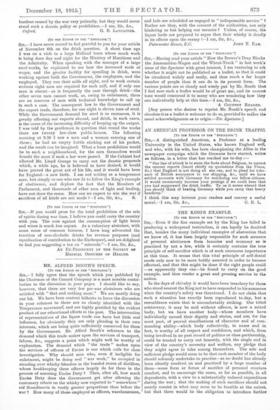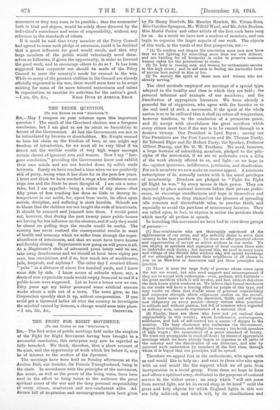• THE KING'S EXAMPLE.
[To THE EDITOR 01 THE " SPECTATOR.") Sur,—Even if the fine example set by the King has failed in producing a widespread teetotalism, it can hardly be doubted that, besides the many individual examples of abstention that we know of, it has been largely responsible for such measure of personal abstinence from luxuries and economy as is practised by not a few, while it certainly contains the true principle of self-sacrifice • which is of such enormous importance at this time. It seems that this vital principle of self-denial needs only now to be more boldly asserted in order to become effectual, and that this might be done if the right people could —as apparently they can—be found to carry on the good example, and thus render a great and pressing service to the nation.
In the days of chivalry it would have been treachery for those who stood nearest the King not to have responded to his summons when the country's safety was threatened. I do not claim that such a situation• has exactly been reproduced to-day, but a resemblance exists that is uncomfortably striking. Our titled aristocracy, it may be said without offence, is now a mixed body, but we have another body—whose members have individually earned their dignity and status, and are, for the most part, of proved steadfastness of character and of com- manding ability—which body collectively, in name and in fact, is worthy of all respect and confidence, and which, from being involved in no past record of politics or class partisanship. could be trusted to carry out honestly, with the single end in view of the country's necessity and welfare, any pledge that they might agree to take among themselves. The sole and sufficient pledge would seem to be that each member of the body should solemnly undertake to practise—as no doubt has already been silently resolved on and practised by a large number of them—some form or forma of sacrifice of personal creature comfort, and to encourage the same, as far as possible, in all dependants, with a view to a substantially reduced expenditure during the war ; that the making of such sacrifices should not merely consist in what may seem to be feasible at the outset, but that there would be the obligation to introduce further
economies as they may seem to be possible ; that the economies' both in kind and degree, would be solely those directed by the individual's conscience and sense of responsibility, without any reference to the standards of others.
If it could be said that every member of the Privy Council had agreed to some such pledge or assurance, could it be doubted that a great influence for good would result, and that very large numbers of the public would voluntarily enrol them- selves as followers, if given the opportunity, in order to forward the good work, and to encourage others to do so ? It has been suggested that corporate use should be made of the Privy Council to meet the country's needs for counsel in the war. While so many of the greatest abilities in the Council are already officially engrossed in the war, there would seem here to be scope existing for some of its more leisured earnestness and talent In organization to exercise its activities for the nation's good.
—I am, Sir, &o., REMO DITOE ET AVEPICE REGE.











































 Previous page
Previous page